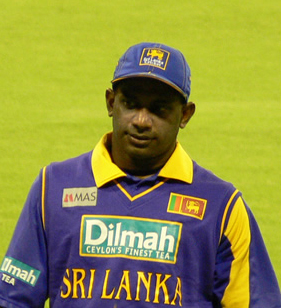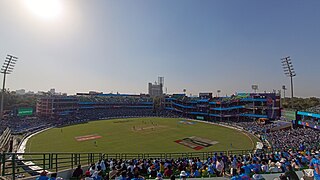Related Research Articles

The Sri Lanka men's national cricket team, nicknamed The Lions, represents Sri Lanka in men's international cricket. It is a full Member of the International Cricket Council (ICC) with Test, One-Day International (ODI) and T20 International (T20I) status. The team first played international cricket in 1926–27 and became an associate member of the ICC in 1965. They were awarded the Test status in 1981, which made Sri Lanka the eighth Test cricket-playing nation. The team is administered by Sri Lanka Cricket.

Deshabandu Sanath Teran Jayasuriya, is a former Sri Lankan cricketer and captain, who is widely regarded as one of the greatest all rounders ever to play in ODI cricket. A left arm opening batsman, an orthodox spinner and a dynamic fielder, Jayasuriya together with his opening partner Romesh Kaluwitharana is credited for having revolutionized one-day international cricket with his explosive batting in the mid-1990s, which initiated the hard-hitting modern-day batting strategy of all nations. He was a key member of the Sri Lankan team that won 1996 Cricket World Cup. Under his captaincy Sri Lanka become joint champions along with India in the 2002 Champions Trophy. Currently, he is also the Head Coach of the Sri Lanka National Cricket Team.

The Asia Cup, officially known as the ACC Men's Asia Cup is a men's international cricket tournament contested between Asian countries in either One Day International format and Twenty20 International format every 2 years. It was established in 1983 when the Asian Cricket Council was founded as a measure to promote goodwill between Asian countries being the only continental championship in cricket where the winning team becomes the champion of Asia. India are the current champions after winning the 2023 edition.

Kumar Chokshanada Sangakkara is a Sri Lankan former professional cricketer who represented Sri Lanka from 2000 to 2015. A former captain in all formats. He was born in Matale, Central Province. In first-class cricket, he played for Nondescripts Cricket Club from 1997–98 to 2013–14 and for Surrey County Cricket Club from 2015 to 2017. Sangakkara is widely regarded as one of the greatest cricketers of all time. He was a key part of the Sri Lankan squads which won the 2001-02 Asian Test Championship, 2002 ICC Champions Trophy and 2014 T20 World Cup.
Mohamed Farveez Maharoof, or Farveez Maharoof, is a Sri Lankan former professional cricketer, who played Tests and ODIs. He first made his impression in the 2004 Under-19 Cricket World Cup in which he captained the Sri Lankan team. He enjoyed a prolific school career for Wesley College, with a highest score of 243 and best bowling figures of 8 for 20. An all-rounder, he made his Test debut in 2004. He was part of the Sri Lankan team which finished as runners-up at the 2007 Cricket World Cup.

Denagamage Praboth Mahela de Silva Jayawardene is a Sri Lankan former professional cricketer and captain of the Sri Lankan national cricket team. He is widely regarded as one of the greatest batsmen from Sri Lankan cricket.

The Arun Jaitley Stadium is a cricket stadium owned and operated by the Delhi & District Cricket Association (DDCA) and located on Bahadur Shah Zafar Marg, New Delhi. It was established in 1883 as the Feroz Shah Kotla Stadium, and named after the nearby Kotla fort. It is the second oldest functional international cricket stadium in India, after the Eden Gardens of Kolkata. As of 25 October 2019, it has hosted 36 Tests, 29 ODIs and 6 T20I.

The England Lions cricket team is England and Wales' "second-tier" team, below the full England cricket team. It is largely intended as a way for promising young cricketers to gain experience of playing international cricket.

The Bangladesh A cricket team, also known as Bangladesh Emerging cricket team, is a cricket team representing Bangladesh, and is the second tier of international Bangladeshi cricket below the full Bangladesh national cricket team. The team played its first game, against the full Pakistan side, in Savar in January 2002.
The history of cricket in Bangladesh predates the foundation of the Bangladeshi state in 1971 by nearly two centuries. Cricket was introduced to Bengal by the British in the eighteenth century but its growth in East Bengal was slow. Following Partition and the creation of East Pakistan, both first-class and Test cricket were played there during the 1950s and 1960s. Although cricket continued to be popular after independence, especially in Dhaka, the country lost first-class status and had to establish itself in international competition as an Associate Member of the International Cricket Council (ICC).
Cricket was introduced to Sri Lanka in the first quarter of the 19th century, following colonisation of the island by the British. The earliest known match was recorded in 1832 and the earliest first-class one in 1926. The national team has played Test cricket from 1982. The national team has achieved international success by winning the 1996 Cricket World Cup and the 2014 ICC World Twenty20. Cricket is played nationwide with Test venues in Colombo, Galle, Kandy and Moratuwa. The country's most notable players include Aravinda de Silva, Arjuna Ranatunga, Rangana Herath, Sanath Jayasuriya, Mahela Jayawardene, Muttiah Muralitharan, Kumar Sangakkara and Chaminda Vaas. Administration and governance are performed by Sri Lanka Cricket, which was founded in July 1922 as the Ceylon Cricket Association (CCA). The main domestic competition is the Premier Trophy which attained first-class status in 1988.
Madhavrao Shindhia Cricket Ground also known as Municipal Corporation Ground or Racecourse Ground is a stadium located in Rajkot, Gujarat, India.
International cricket teams raised by Marylebone Cricket Club (MCC) have visited Sri Lanka, formerly Ceylon, on 23 occasions from 1911-12 until the most recent tour in the winter of 2000-01. Eleven of the teams were England national cricket teams raised by MCC during the period when it held responsibility for Test cricket played by England. The other twelve were MCC teams per se which did not take part in Test cricket.

Lokuge Dinesh Chandimal is a professional Sri Lankan cricketer and a former captain of the Sri Lanka national cricket team. A handy right-handed middle order batter who sometimes plays as the wicket-keeper, Chandimal lead Sri Lanka in the group stages of the 2014 ICC World Twenty20 in which Sri Lanka ended up as the champions.

The 2011 Cricket World Cup Final was the final match of the 2011 Men's Cricket World Cup, the 10th edition of ICC's championship of One Day International (ODI) cricket. The match was played between India and Sri Lanka at the Wankhede Stadium, Mumbai on Saturday 2 April 2011. It was the first time that two Asian teams had faced each other in an ODI World Cup final. India won the match by six wickets—its second World Cup win after the 1983 tournament—and became the third team to have won the title more than once, after Australia and the West Indies. India became the first country to win the Cricket World Cup in their own country.

Deshabandu Pinnaduwage Aravinda de Silva is a former Sri Lankan cricketer and captain, Regarded as one of the best Sri Lankan cricketers, he played in the team as an all-rounder. De Silva was a key member of the Sri Lankan team that won 1996 Cricket World Cup, where he scored a match winning century in the final, that brought Sri Lanka from underdog status to present-day form. He has held various posts in Sri Lankan Cricket after his retirement in 2003. He was inducted into ICC Cricket Hall of Fame in 2023.
The England national cricket team, organised by Marylebone Cricket Club (MCC), toured India, Pakistan and Sri Lanka from December 1972 to March 1973 and played a five-match Test series against the India national cricket team followed by three Tests against the Pakistan national cricket team. England were captained by Tony Lewis. The Sri Lanka national cricket team was not Test-qualified at that time and played a single first-class match against MCC in Colombo.
A cricket team from England, organised by the Marylebone Cricket Club, toured India and Sri Lanka in the 1976-77 cricket season. They played five Test matches against the India national cricket team, with England winning three matches, India winning one and the other one being drawn. The MCC team played four matches in Sri Lanka after leaving India, but Sri Lanka was not yet a Test-class team.
The West Indies cricket team, captained by Clive Lloyd, toured India, Sri Lanka and Pakistan from November 1974 to March 1975 and played a five-match Test series against the India national cricket team followed by a two-match series against the Pakistan national cricket team. West Indies won the series in India 3–2 and the series in Pakistan was drawn 0–0. In Sri Lanka, the West Indians played two internationals against the Sri Lanka national cricket team which had not then achieved Test status; therefore, the internationals played at the Colombo Cricket Club Ground and the Paikiasothy Saravanamuttu Stadium, both in Colombo, are classified as first-class matches. India was captained by Mansoor Ali Khan Pataudi, Pakistan by Intikhab Alam and Sri Lanka by Anura Tennekoon.
The West Indies cricket team, captained by Alvin Kallicharran, toured India and Sri Lanka from November 1978 to February 1979 and played a six-match Test series against the India national cricket team. India won the series 1–0. In Sri Lanka, the West Indians played two internationals against the Sri Lanka national cricket team which had not then achieved Test status; therefore, the internationals played at the Paikiasothy Saravanamuttu Stadium and the Sinhalese Sports Club Ground, both in Colombo, are classified as first-class matches. India were captained by Sunil Gavaskar and Sri Lanka by Anura Tennekoon.It was first test series win for India at home against West Indies
References
- ↑ "India in Sri Lanka 1973–74". CricketArchive. Retrieved 5 July 2014.